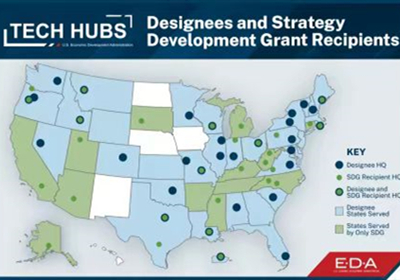
On May 12, 2023, the Biden-Harris administration, through the U.S. Department of Commerce’s Economic Development Administration (EDA), launched the Regional Technology and Innovation Hubs (Tech Hubs) competition. This program will create tech hubs in regions across the country by bringing together industry, higher education institutions, state and local governments, economic development organizations, and labor and workforce partners to supercharge ecosystems of innovation for technologies that are essential to our economic and national security.
The program was authorized by the CHIPS and Science Act and is a key part of President Joe Biden’s Investing in America agenda, stimulating private sector investment, creating good-paying jobs, revitalizing American manufacturing, and ensuring no community is left behind by America’s economic progress. The plan is currently in its second phase.
Although the United States is recognized as a country with great technological innovation vitality and has a world-leading technological innovation system, the geographical distribution of this system is extremely uneven. U.S. Secretary of Commerce Gina Raimondo said: "Currently, the technology and innovation ecosystem is concentrated in only a few regions across the country and fails to reflect the full potential of our country."
Thus, the U.S. Department of Commerce launched the "2023 Regional Technology and Innovation Hub Program" to encourage private enterprises, higher education institutions, state and local governments, non-profit organizations, and labor unions to join forces to form regional science and technology innovation alliances, create an innovation ecosystem. The plan will identify a group of regional technology and innovation hub in the form of two rounds of competitions, focusing on areas with backward technology, stimulating private enterprise investment, creating high-paying jobs, and revitalizing the U.S. manufacturing industry.
Phase 1
On October 23, President Biden and Secretary of Commerce Gina Raimondo announced the results the designation of 31 communities across the country as Regional Innovation and Technology Hubs (Tech Hubs) through the Department of Commerce Economic Development Administration. These Tech Hubs catalyze investment in technologies critical to economic growth, national security, and job creation, and help communities across the country become centers of innovation critical to American competitiveness. The Tech Hubs cover areas such as automated systems, quantum technology, semiconductors, electric vehicles, critical minerals, biopharmaceuticals, new materials and clean energy - key areas of President’s Bidenomics agenda, and the Tech Hubs meet the following conditions:
Demonstrate the main scientific and technological strength of the region and the investment potential of the science and technology center alliance, that is, the ability to make the main innovative industries in the region become global leaders in key technologies of a certain field within ten years;
Focus on regions with the assets, resources, capacity, and potential to become globally competitive, within approximately ten years, in the technologies and industries of the future;
Focus on one of the following ten key areas:
(1) Artificial intelligence, machine learning, autonomy, and related advances;
(2) High performance computing, semiconductors, and advanced computer hardware and software;
(3) Quantum information science and technology;
(4) Robotics, automation, and advanced manufacturing;
(5) Natural and anthropogenic disaster prevention or mitigation;
(6) Advanced communications technology and immersive technology;
(7) Biotechnology, medical technology, genomics, and synthetic biology;
(8) Data storage, data management, distributed ledger technologies, and cybersecurity, including biometrics;
(9) Advanced energy and industrial efficiency technologies, such as batteries and advanced nuclear technologies, including but not limited to for the purposes of electric generation;
(10) Advanced materials science, including composites 2D materials, other next-generation materials, and related manufacturing technologies.
For too long, economic growth and opportunity has clustered in a few cities on the coasts. Tech Hubs awardees were selected to represent the full diversity of America, selected from more than 370 applications spanning 49 states and four territories. The Tech Hubs will bring the benefits and opportunities of scientific and technological innovation to communities across the country, with nearly three-quarters significantly benefitting small and rural areas and more than three-quarters directly supporting historically underserved communities. The Tech Hubs all include workforce organizations such as labor unions, helping create good-paying, union jobs in the communities where workers live. And, in addition to the 31 Tech Hubs, the Department of Commerce is awarding 18 coalitions Strategy Development Grants to build economic development plans to compete for future rounds of the Tech Hub program.
Phase 2
Applicants identified as Tech Hubs in the first phase are eligible to compete in the second phase. At this stage, EDA will select 5-10 Tech Hubs to provide Implementation Grants; for each Tech Hubs selected for Implementation Grants, EDA expects to fund approximately 3-8 tightly aligned projects – totaling between $40 million and $70 million each – that aim to collectively address the region’s key inhibitors of global competitiveness. The second phase of competition is still in the registration stage, and the application channel will be closed on February 29, 2024.
According to Tech Hubs Phase 2 Notice of Funding Opportunity (NOFO), the selection criteria involve seven aspects:
1. Project quality, ability to execute, and private sector integration;
2. Impact on economic and national security;
3. Investment and policy commitments;
4. Developing, recruiting, and retaining talent and workforce;
5. Capital formation, deployment, and access;
6. Equity and diversity;
7. Governance, leadership, and evaluation.